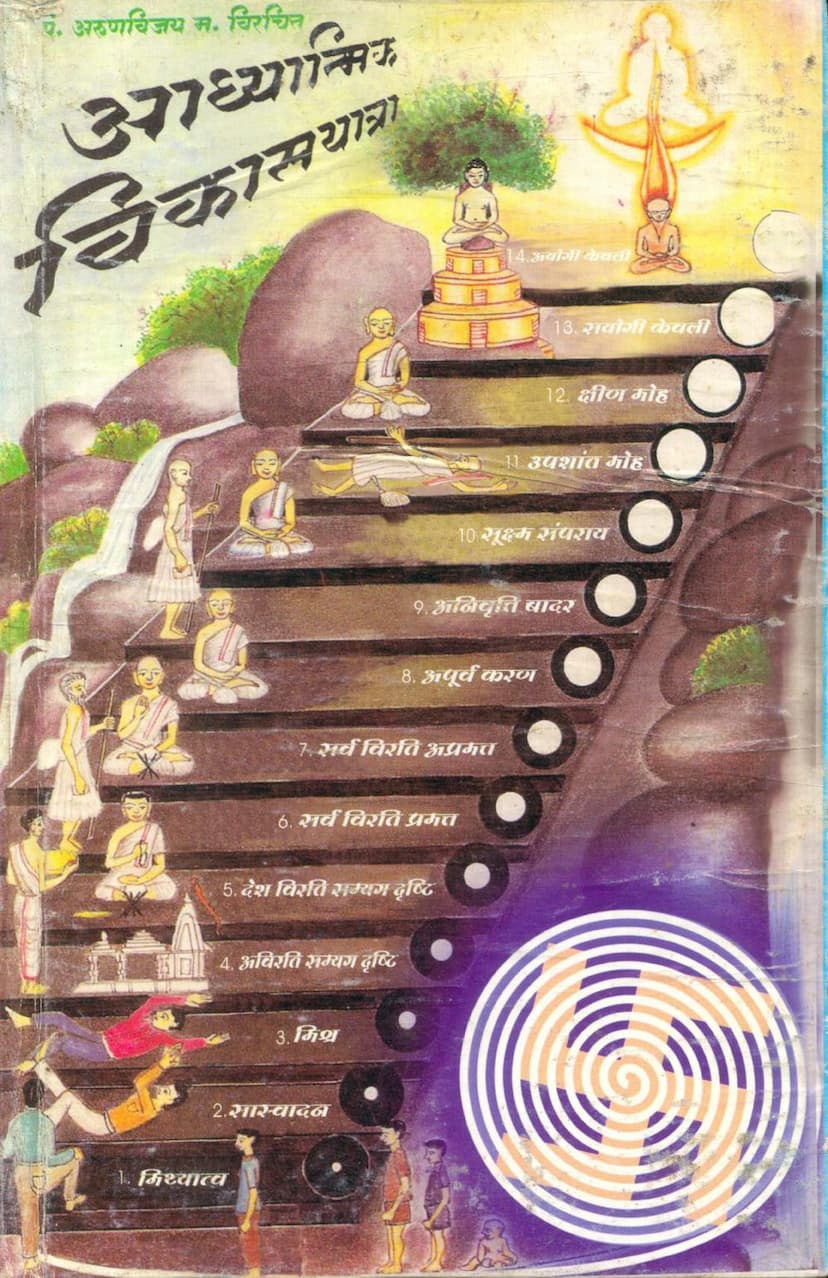Aadhyatmik Vikas Yatra Part 02
Added to library: September 1, 2025

Summary
This book, "Aadhyatmik Vikas Yatra Part 02" (Spiritual Development Journey Part 02), authored by Arunvijay M. and published by Vasupujyaswami Jain SMP Sangh, is the second volume in a series aimed at guiding individuals on their spiritual path within the framework of Jain philosophy. The catalog link provided suggests it is part of a larger collection available on jainqq.org.
The book's core theme is the spiritual progression of the soul through the fourteen Guṇasthānas (stages of spiritual development) as outlined in Jainism. The initial pages present a visual representation of these fourteen stages, starting from "Mithyātva" (False Belief) and progressing through various stages of partial and complete renunciation, culminating in the states of "Yogī Kevalī" (Kevalī in a state of Yoga) and "Sarvajña Kevalī" (Omniscient Kevalī).
Key aspects covered in the initial chapters and implied by the table of contents and introductory remarks include:
-
The Fourteen Guṇasthānas: The book details the journey through these stages, which represent the soul's gradual purification and shedding of karmic obstructions. The stages are listed as:
- Mithyātva (False Belief)
- Sāsvādana (Taste of Righteousness)
- Mishra (Mixed/Undecided State)
- Avirati Samyakdṛṣṭi (Incomplete Righteousness)
- Deśavirati Samyakdṛṣṭi (Partial Righteousness)
- Sarvavirati Pramatta (Complete Restraint - Careless)
- Sarvavirati Apramatta (Complete Restraint - Careful)
- Apūrvakaraṇa (Unprecedented Causation)
- Anivṛtti Bādara (Subtle Causation - without cessation)
- Sūkṣma Samparāya (Subtle Passions)
- Upāśānta Moha (Pacified Passions)
- Kṣīṇa Moha (Eradicated Passions)
- Yogī Kevalī (Omniscient with Body)
- Sarvajña Kevalī (Omniscient, Liberated Soul)
-
The Author's Intent: The author, Arunvijay M. (identified as a scholar with double M.A. and Ph.D., disciple of Acharya Prem Suri M.S. and brother of Acharya Vijay Subodh Suri M.S.), aims to provide a comprehensive and accessible explanation of this complex spiritual journey. He addresses hundreds of questions related to spiritual development, the nature of obstacles (like Karma), and the path to liberation. The book serves as a mirror to the soul, helping readers identify their current spiritual position and understand the steps needed for advancement.
-
Focus on Samyakdarśana (Right Faith): Chapter 8, "Samyakdarśana Guṇasthāna par Ārohaṇa" (Ascending to the Stage of Right Faith), and Chapter 9, "Samyakdarśana Prāpti kā Adbhut Ānanda" (The Wonderful Joy of Attaining Right Faith), highlight the crucial importance of attaining Samyakdarśana as a pivotal step in spiritual progress. The text delves into the nature of Mithyātva (false beliefs) as the primary obstacle and explains the process of ascending to Samyakdarśana. It also discusses the classification of souls into Bhavya (capable of liberation), Abhavya (incapable of liberation), and Jātibhavya (born with potential for liberation), and the role of Pāriṇāmika Bhāva (inherent disposition) in this context.
-
The Role of Karma: The text emphasizes that Karma is the fundamental impediment to spiritual growth. It explains how Mohaniya Karma (delusion-inducing karma) plays a central role in binding the soul and obscuring its true nature. The intricate science of karma (Karma Vijñāna) is presented as a unique contribution of Jainism. The book also details the duration of karmic bondage (Sthiti Bandha) for various types of karma.
-
Vows and Observances (Vratas): Chapters 10 onwards discuss the practical aspects of spiritual discipline, particularly focusing on the life of a Śrāvaka (devout layperson). This includes the five Aṇuvratas (minor vows) and other practices like Guna Vratas (virtue vows) and Śikṣā Vratas (disciplinary vows) which are essential for spiritual progress at the household level. The text elaborates on the Mṛṣāvāda Viramaṇa Vrata (vow of abstaining from falsehood), Adattādāna Viramaṇa Vrata (vow of abstaining from stealing), Maithuna Viramaṇa Vrata (vow of celibacy/restraint from illicit sexual activity), and Parigraha Parimāṇa Vrata (vow of limiting possessions). It also details the concept of Sāmāyika, Pauṣadha, and Atithi Saṁvibhāga Vrata as crucial practices for lay followers.
-
Spiritual Qualities and Practices: The book highlights the development of virtues like Ahiṁsā (non-violence), Satya (truthfulness), Ahiṁkāra (non-possessiveness), Brahmacharya (celibacy/right conduct), Kṣamā (forgiveness), Dayā (compassion), and Tapa (austerity). It emphasizes the need for Jayaṇā (carefulness) in daily activities to minimize harm to living beings.
-
The Ideal of a Saintly Life (Sadhu): The text also touches upon the path of a Sadhu (monk), highlighting the importance of complete renunciation, adherence to Mahavratas, and the pursuit of liberation through rigorous spiritual practices. The concept of Pramatta (careless) and Apramatta (careful) states of mind is discussed in relation to the stages of spiritual development.
-
The Importance of Sincere Devotion: The narrative stresses that true spiritual progress comes from sincere internal disposition (Bhāva) rather than mere external rituals. The author encourages readers to strive for genuine spiritual understanding and practice.
-
The Author's Motivation: The book is presented as a spiritual endeavor, potentially inspired by personal experiences and a desire to guide others. The author's profound respect for his gurus and lineage is evident in the dedications and acknowledgments.
In essence, "Aadhyatmik Vikas Yatra Part 02" is a detailed manual for spiritual seekers, offering a systematic approach to understanding and traversing the path of spiritual evolution according to Jain principles, with a particular emphasis on the stages of development, the obstacles posed by karma, and the practices necessary for soul purification and ultimate liberation.